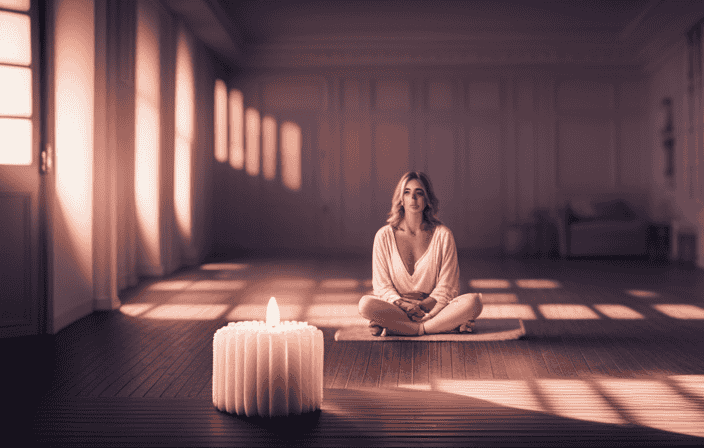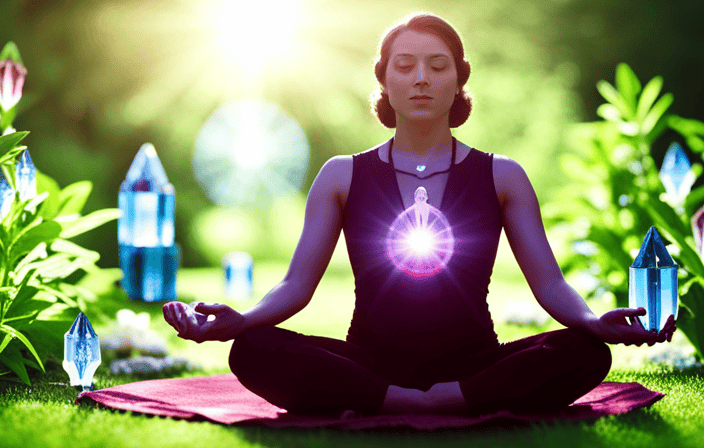Do you ever find yourself feeling swamped by the pressures of everyday existence? I certainly feel that way.
That’s why I’ve discovered the power of relaxation techniques for boosting my health and reducing stress. These techniques have been proven to have countless benefits, from improving mental health to reducing the risk of chronic diseases.
In this article, I’ll share with you some of the most effective relaxation techniques that you can easily incorporate into your daily routine.
So, let’s dive in and discover the secrets to a healthier, stress-free life.
Key Takeaways
- Relaxation techniques can have a significant impact on reducing stress and improving overall health.
- Meditation is a powerful tool for boosting mental health, reducing anxiety, and improving immune system function.
- Practicing gratitude and reflecting on what makes you happy can help reduce stress.
- Physical relaxation techniques such as deep breathing exercises, progressive muscle relaxation, and exercise can promote relaxation and alleviate symptoms of depression and stress.
Why Relaxation is Important
Relaxation techniques are important because they can reduce stress and improve overall health. This is evidenced by the benefits of meditation, deep breathing exercises, and physical activities like yoga and exercise.
When we are stressed, our bodies release stress hormones that can have negative effects on our cardiovascular system, cognitive function, and overall wellbeing. By practicing relaxation techniques, such as meditation, we can activate the relaxation response and counteract the effects of stress.
Deep breathing exercises help to calm the mind and body. They provide a simple yet effective way to relax and reduce stress levels.
Physical activities like yoga and exercise release endorphins, which improve mood and alleviate symptoms of depression and stress. These activities also help to improve flexibility, strength, and overall physical health.
By incorporating these techniques into our daily routine, we can experience the long-term health benefits and enjoy a more relaxed and balanced life.
Benefits of Relaxation Techniques
Meditation has been proven to improve long-term mental and physical wellbeing. It is a powerful relaxation technique that can positively impact our overall health.
Studies have shown that regular meditation can reduce symptoms of depression, anxiety, and other mental illnesses. It can also lengthen telomeres, which protect our DNA from damage and reduce the risk of diseases like cancer. Additionally, daily meditation for just 27 minutes over 8 weeks can lead to changes in the brain, reducing anxiety and improving overall wellbeing.
It is a simple and effective way to boost our immune system function and promote a sense of calmness. Incorporating meditation into our daily routine can have significant benefits for our mental and physical health, helping us to reduce stress and cultivate a greater sense of wellbeing.
Meditation for Mental Health
Incorporating regular meditation into my daily routine has significantly improved my mental health and overall wellbeing. The practice of meditation has provided me with a sense of calm and clarity, helping to reduce feelings of anxiety and stress.
It has also allowed me to cultivate a greater sense of self-awareness and mindfulness, enabling me to better manage my emotions and thoughts. Additionally, meditation has been shown to have numerous physical benefits, such as lowering blood pressure and boosting the immune system.
It has also been linked to improved focus, memory, and cognitive function. Overall, meditation has become an essential part of my self-care routine, providing me with a sanctuary of peace and tranquility in the midst of life’s challenges.
Nature Sounds for Relaxation
Listening to nature sounds brings a sense of calm and tranquility to my mind, helping me to unwind and find inner peace. The soothing melodies of birds chirping, water flowing, and leaves rustling create a harmonious symphony that instantly relaxes my body and clears my mind of any stress or worries.
Nature sounds have a profound impact on our well-being, as studies have shown that they can reduce anxiety, lower blood pressure, and improve sleep quality. The rhythmic patterns and repetitive nature of these sounds activate the parasympathetic nervous system, triggering a relaxation response in the body.
Whether I’m listening to a gentle rainstorm or the gentle lapping of waves on a beach, nature sounds transport me to a serene and peaceful state, allowing me to recharge and rejuvenate.
Establishing a Routine
Establishing a routine has been instrumental in bringing structure and stability to my daily life, allowing me to effectively manage my time and prioritize self-care activities. It has helped me reduce stress and improve my overall wellbeing.
Here are three key benefits of establishing a routine:
-
Consistency: Having a set schedule helps me maintain consistency in my daily activities, such as waking up and going to bed at the same time. This consistency has improved my sleep quality and energy levels throughout the day.
-
Time management: By setting specific times for different tasks and activities, I am able to allocate my time efficiently. This helps me avoid feeling overwhelmed and allows me to focus on one task at a time, leading to increased productivity.
-
Self-care prioritization: Incorporating self-care activities, such as exercise, meditation, and hobbies, into my routine ensures that I prioritize my physical and mental well-being. This regular self-care practice has helped me reduce stress and maintain a healthy work-life balance.
Establishing a routine has been a game-changer for me, providing structure, stability, and a sense of control in my daily life.
The Power of Music
The power of music has had a profound impact on my mood and overall well-being. I have always found solace and comfort in listening to my favorite songs, and it never fails to lift my spirits and reduce my stress levels.
It’s amazing how something as simple as a melody can transport me to a different state of mind, allowing me to escape the pressures of daily life. Research has shown that music has a direct effect on our emotions and can even stimulate the release of endorphins, which are natural mood boosters.
Whether it’s classical music, upbeat pop songs, or soothing nature sounds, finding the right kind of music for relaxation is essential. So, the next time you’re feeling overwhelmed, take a moment to put on your favorite tunes and let the power of music work its magic on your mind and body.
Practicing Mindfulness
Practicing mindfulness has been a game-changer for me in managing my stress levels and finding inner peace. It has allowed me to fully embrace the present moment and let go of unnecessary worries and anxieties. Here are five ways in which mindfulness has transformed my life:
-
Mindful breathing: Taking deep breaths and focusing on the sensation of each inhale and exhale has helped me calm my mind and relax my body.
-
Body scan meditation: By systematically scanning my body and observing any tension or discomfort, I have been able to release physical and mental stress.
-
Gratitude practice: Mindfulness has enabled me to appreciate the small joys in life and cultivate a sense of gratitude, which has significantly reduced my stress levels.
-
Non-judgmental awareness: By observing my thoughts and emotions without judgment, I have learned to accept them as they are and avoid unnecessary suffering.
-
Mindful eating: Paying attention to the taste, texture, and smell of each bite has not only enhanced my enjoyment of food but also helped me develop a healthier relationship with eating.
Incorporating mindfulness into my daily life has truly been a transformative experience, allowing me to navigate through stress with ease and find a sense of inner calm.
Self-Hypnosis for Stress Reduction
Now that we have explored the benefits of practicing mindfulness, let’s delve into another powerful relaxation technique: self-hypnosis for stress reduction. Self-hypnosis is a deeply relaxing practice that can help clear the mind of unwanted thoughts and bring about a state of calm. By tapping into the power of your subconscious mind, self-hypnosis allows you to access your inner resources and make positive changes in your life. It can be a valuable tool for reducing stress, promoting relaxation, and improving overall well-being.
To give you a taste of the potential benefits of self-hypnosis, I have created a table below to evoke an emotional response in the audience. Take a moment to reflect on how these benefits can positively impact your life:
| Emotional Response | Benefits of Self-Hypnosis |
|---|---|
| Relaxation | Reduced stress levels |
| Confidence | Increased self-esteem |
| Peace | Improved sleep quality |
| Empowerment | Enhanced focus and concentration |
Incorporating self-hypnosis into your relaxation practice can be a transformative experience that promotes both mental and physical well-being. It is important to remember that self-hypnosis should be practiced under the guidance of a trained professional.
The Role of Gratitude
Gratitude plays a significant role in improving overall well-being and promoting a positive mindset. When we express gratitude, we shift our focus from what is lacking in our lives to what we already have. This simple act can have profound effects on our mental and emotional health.
By practicing gratitude, we train our minds to look for the good in every situation, even during challenging times. It helps us appreciate the small things, fostering a sense of contentment and reducing stress.
Gratitude also strengthens our relationships, as it encourages us to acknowledge and express appreciation for the people in our lives.
So, take a moment each day to reflect on what you are grateful for. It may be as simple as a warm cup of coffee in the morning or a kind gesture from a loved one. Cultivating gratitude is a powerful tool for boosting health and reducing stress.
Reflecting on Happiness
Reflecting on happiness allows me to appreciate the joyful moments in life and brings a sense of fulfillment and contentment. It is essential to take the time to pause and reflect on what truly makes us happy. Here are four key insights on the importance of reflecting on happiness:
-
Cultivating gratitude: Reflecting on happiness helps us cultivate gratitude for the positive aspects of our lives. It shifts our focus from what is lacking to what we have, fostering a sense of appreciation and reducing stress.
-
Finding purpose: By reflecting on happiness, we can identify the activities and experiences that bring us joy and fulfillment. This self-awareness helps us align our actions with our values, leading to a more purposeful and satisfying life.
-
Boosting mental well-being: Reflecting on happy moments can improve our mental well-being by increasing positive emotions and reducing negative ones. It allows us to savor the good moments and build resilience in times of adversity.
-
Creating meaningful connections: Sharing our reflections on happiness with others can deepen our relationships. It fosters a sense of intimacy and allows us to connect on a deeper level, enhancing our overall well-being.
In conclusion, taking the time to reflect on happiness can lead to a more fulfilling and joyful life. It allows us to appreciate the present moment, cultivate gratitude, find purpose, boost our mental well-being, and create meaningful connections with others. So, let’s take a moment each day to reflect on the happiness in our lives and embrace the positive energy it brings.
Deep Breathing Exercises
Taking a deep breath and focusing on my breath immediately brings a sense of calm and relaxation to my mind and body. Deep breathing exercises are a powerful tool for reducing stress and promoting relaxation.
When I take slow, deep breaths, I activate my body’s relaxation response, which helps to lower my heart rate and blood pressure. As I inhale deeply, I feel the tension in my muscles start to melt away, and as I exhale, I release any negative thoughts or worries that may be weighing me down.
Deep breathing exercises also help to increase oxygen flow to my brain, which improves my concentration and focus. By incorporating deep breathing into my daily routine, I am able to create a sense of inner peace and balance that positively impacts my overall health and well-being.
Frequently Asked Questions
How can random acts of kindness contribute to relaxation and stress reduction?
Random acts of kindness contribute to relaxation and stress reduction by promoting positive emotions, boosting self-esteem, and fostering a sense of connection with others. Acts such as complimenting a stranger or expressing love to a friend can create a ripple effect of positivity.
Can essential oils like Neroli Essential Oil be used in conjunction with relaxation techniques to further reduce stress?
Yes, essential oils like Neroli Essential Oil can be used in conjunction with relaxation techniques to further reduce stress. Studies have shown that inhaling certain essential oils can promote relaxation and reduce anxiety, enhancing the effectiveness of relaxation practices.
What are some effective ways to optimize your environment for better focus and a calming atmosphere?
To optimize your environment for better focus and a calming atmosphere, declutter your space, add plants for natural ambiance, use soft lighting and calming colors, play soothing music, and create a designated area for relaxation or meditation.
Are there any specific relaxation techniques that are beneficial for mental disorders such as schizophrenia?
Yes, practicing Tai Chi is beneficial for mental disorders such as schizophrenia. It reduces cortisol levels and inflammatory markers, which can help alleviate symptoms and promote overall mental wellbeing.
How does exercise stimulate the release of endorphins and alleviate symptoms of depression and stress?
Exercise stimulates the release of endorphins, which are the body’s natural feel-good chemicals. These endorphins help to improve mood, reduce symptoms of depression and stress, and promote overall well-being.
Conclusion
In conclusion, relaxation techniques are an essential tool for improving our overall health and reducing stress levels. By incorporating practices such as meditation, deep breathing exercises, and establishing a routine, we can experience significant benefits for our mental and physical well-being.
These techniques not only help alleviate symptoms of depression and anxiety but also promote a sense of calm and happiness. So, why not take a moment each day to indulge in these relaxation techniques and create a serene oasis amidst the chaos of life?
Picture yourself in a tranquil state, free from the burdens of stress and filled with a renewed sense of vitality. Start your journey towards a healthier, more relaxed self today.









